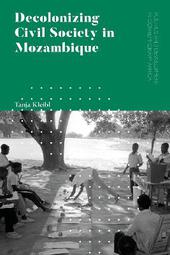
|
Decolonizing Civil Society in Mozambique: Governance, Politics and Spiritual Systems
Hardback
Main Details
Description
By demonstrating that Western conceptions of 'civil society' have provided the framework for interpreting societies in the Global South, Decolonizing Civil Society in Mozambique argues that it is only through a critical deconstruction of these concepts that we can start to re-balance global power relationships, both in academic discourse and in development practices. Examining the exclusionary discourses framing the support for Western-type NGOs in the development discourse - often to the exclusion of local social actors - this book dissects mainstream contemporary ideas about 'civil society', and finds a new means by which to identify local forms of social action, often based in traditional structures and spiritual discourses. Outlining new conceptual ideas for an alternative framing of Mozambique's 'civil society', Kleibl proposes a series of fresh theoretical issues and questions alongside empirical research, moving towards a series of new policy and practice arguments for rethinking and decolonizing civil society in the Global South.
Author Biography
Tanja Kleibl is currently Professor of Social Work, Migration and Diversity at the University of Applied Sciences Wurzburg-Schweinfurt, Germany and Research Associate at the University of Johannesburg, South Africa.
ReviewsAn unflinching critique of the unproblematized transfer of philosophies that underpin Western conceptualization of civil society to Mozambique in particular and Africa in general. This book unravels how the civil in civil society is lost through co-option by an authoritarian state and the concomitant exclusion of the marginalized and powerless. * Rose Jaji, University of Zimbabwe * Decolonizing Civil Society in Mozambique makes a serious contribution to the study of Mozambique from an engaged decolonial perspective. It ranges widely across social theory but it is always grounded. Students of development studies and of contemporary Africa will find it fascinating. It is also a fine contribution towards decolonizing the curriculum. * Ronaldo Munck, Professor of Sociology, Dublin City University * A fascinating analysis of civil society in Mozambique that is both timely and important. Kleibl manages to critically engage the complexities of civil society relations that both challenges our theoretical, as well as empirical understanding of a phenomenon we tend to take for granted. Decolonizing Society in Mozambique raises important questions related to the Frelimo state's uneasy relationship to society in all its manifestations. * Lars Buur, Associate Professor Roskilde University * Professor Kleibl interrogates the whole notion of decolonization from the lens of civil society, while focusing on the socio-political and economic context of Mozambique. In her exposition, Professor Kleibl unpacks the historical, political, economic, spiritual and religious realities that influence the conceptual understanding of civil society in a given context and outlines the major dynamics linked to civil society encountered in Mozambique. * Ndangwa Noyoo, Associate Professor, University of Cape Town, South Africa *
|